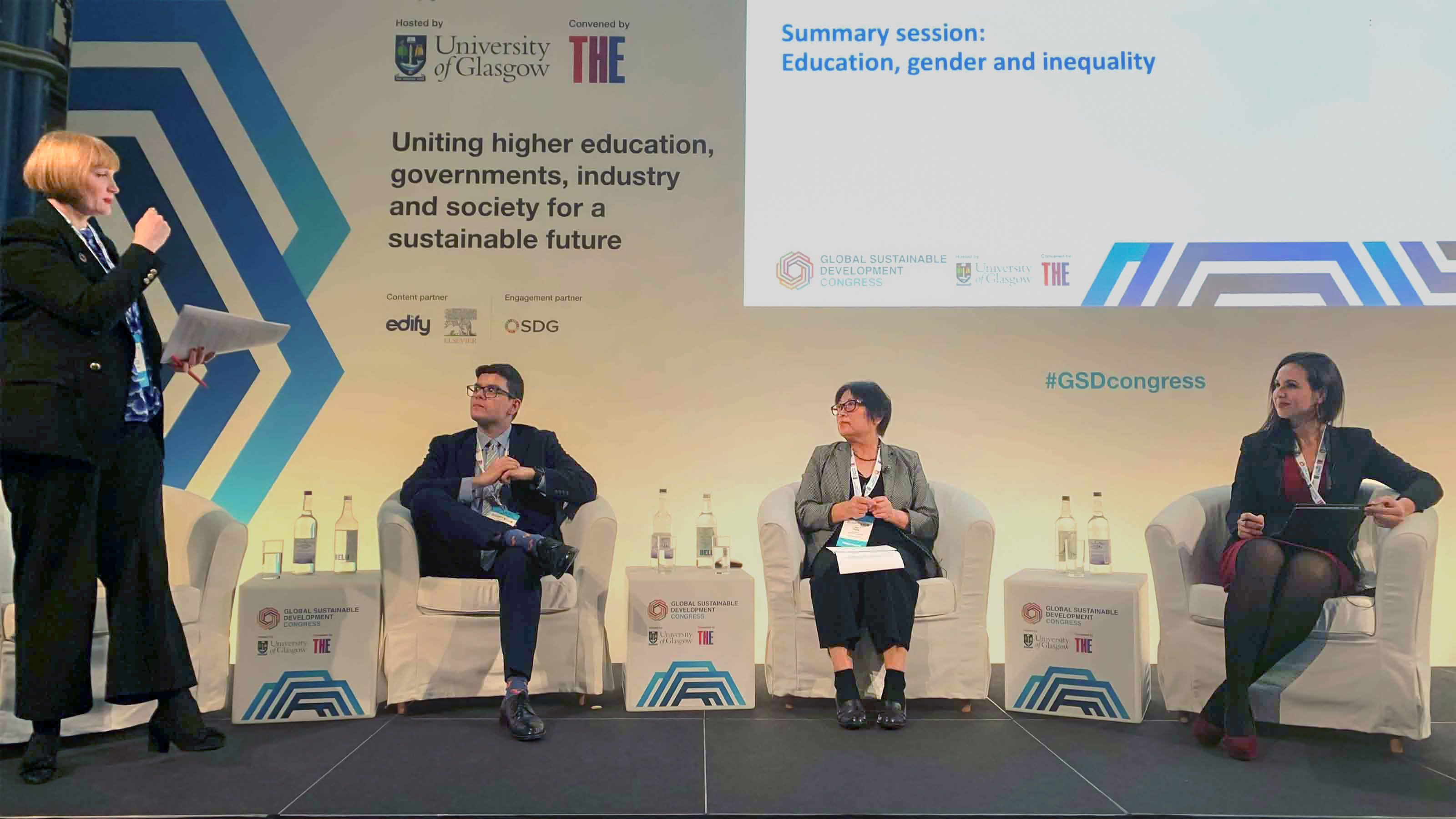Last week I returned to one of my alma maters, the University of Glasgow, to attend the Global Sustainable Development Congress convened by Times Higher Education. While there, I participated in a number of panel discussions where I was able to speak about the role of universities in ensuring a more equitable world and how the University of Alberta is meeting this challenge.
Globalization is not a neutral force that delivers benefits evenly to all parts of the world. Unbalanced development in the world seems to have reached a critical tipping point indicated by climate change, the global pandemic and rising populism in politics. Ethical internationalization in higher education is no longer a choice — it is a must. Equitable partnership between the Global North and the Global South is of vital importance if we want to survive as one global community and thrive with a shared future.
The central question addressed by the Congress was: how can universities most effectively contribute to building a more equitable society? As I stressed in my panels, this can be done by aligning the university’s strategic planning — including internationalization, EDI and Indigenous strategies — with the UN’s Sustainable Development Goals (SDGs).
Universities that adopt this framework as the foundation of their operations will have a strong compass or roadmap to guide them as they transform their institutional activities and partnerships in support of a more sustainable, more equitable and more just world for all.
- At the individual level, they will better prepare their students for success as responsible global citizens and global leaders in an increasingly interconnected world;
- At the national level, they will help their countries to move towards a more sustainable economic future; and
- At the global level, they will make positive contributions to solving global challenges, reducing inequality and fostering authentic, mutually beneficial international partnerships.
Participating in the 2022 Times Higher Education Impact Rankings gave the U of A an important opportunity to survey our university’s current global engagement, partnerships and impacts from the ground up. We are proud of being ranked 11th in the world for our contributions to a sustainable, equitable and just world.
We are a highly globalized university with a highly international professoriate who collaborate with fellow researchers from around the world, working on solutions for global pressing challenges and training a highly international graduate student body. Each of our professors’ teaching and research activities serve to contribute to the university's SDG impact. The U of A Sustainability Council works with all faculties to spark learning, discovery and citizenship for sustainability.
Many of our graduate students from Latin America, Asia and Africa have returned to their home countries to work as academics and policy makers, and have continued to collaborate with our professors. Our highly ranked Faculty of Nursing has been training nursing professionals and leaders in Ghana, Kenya, Uganda and Pakistan through partnership with the University of Ghana and the Aga Khan University. Our Faculty of Education has been training teacher educators and working on curriculum reform in Tanzania and Oman through partnership with local universities and national Ministries of Education.
We have to remember that these partnerships are mutually beneficial, exposing our faculty and students to different world perspectives, national contexts and unique culturally-based practices. These rich learning experiences propel our graduates to become leaders in their fields with the core skills and competencies to tackle the most pressing global challenges that we are facing today.
It is critically important to involve students and the student voice in supporting universities’ work in addressing global challenges. Students are the heart of sustainable development. They are the future leaders and changemakers for a more just and equitable world; there is no way to achieve our SDG goals without the work and support of students.
The SDG Student Alliance, which started at the U of A and has grown across the country, educates and raises awareness of the Sustainable Development Goals. The University holds annual International Week and Sustainability Awareness Week centred on SDGs. There are also many student clubs and groups working on raising awareness of SDGs on campus.
Building global relationships across universities, non-government organizations and governments especially with the Global South is critical for us to support the UN’s SDGs. Through these partnerships, we can work together and leverage our resources. By challenging and supporting each other to prioritize the SDGs, we can hold each other accountable to achieve the goals of this important mission.
Faced with the challenge of inequitable development, a university’s international work should become a more mindful, idealistic and transformative force, aimed at uplifting the global community through strong research and education partnerships.
There will be more discussions taking place and plans being made towards this end at the 27th Conference of the Parties of the UNFCCC (COP 27) — read more on this in President Flanagan's message.
Cen Huang
Vice-Provost and Associate Vice-President (International)
